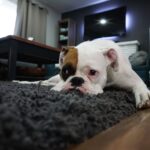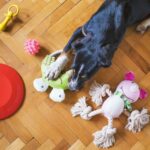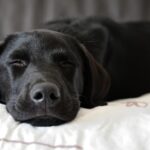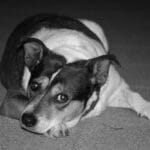If you’ve ever noticed your beloved pooch constantly rubbing their face after eating a meal, you might consider it nothing more than a harmless habit.
However, while the behavior isn’t necessarily always something to worry about, there’s a lot more to your dog rubbing their face than initially meets the eye.
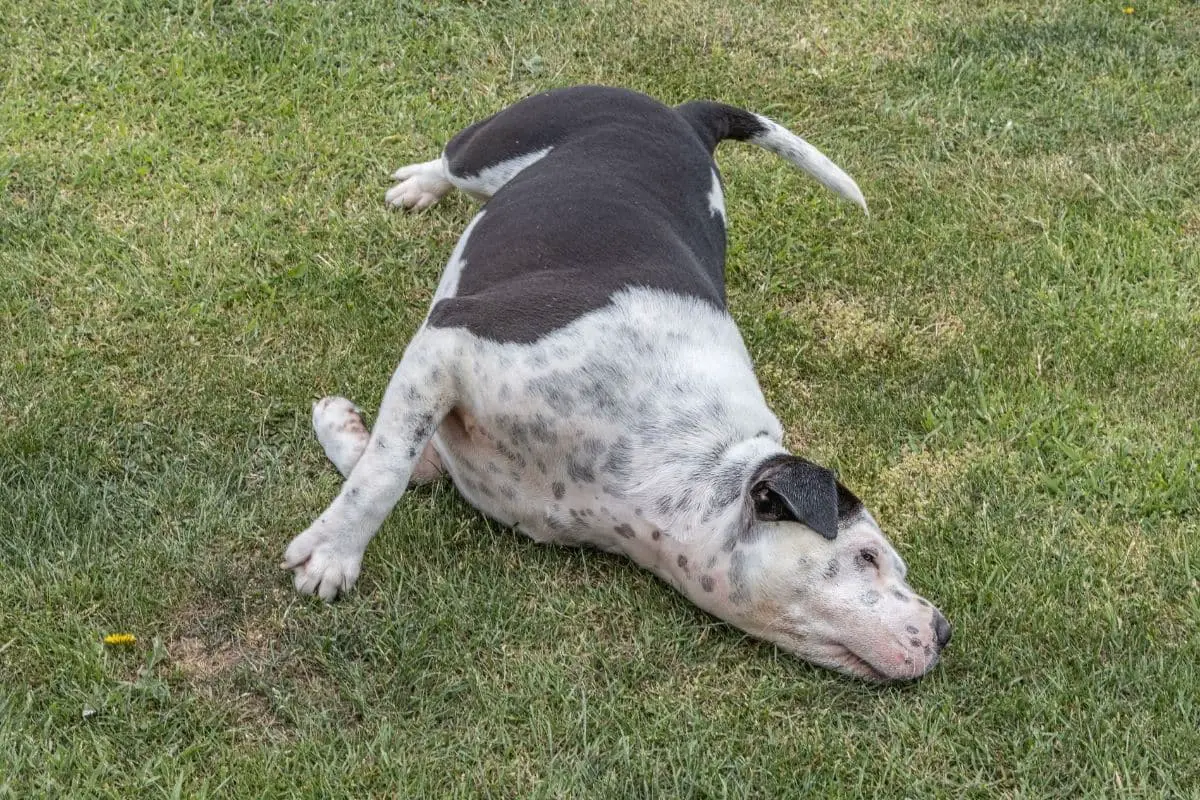
With this in mind, our guide will take a closer look at six of the most common explanations as to why your dog might decide to rub their face after finishing a meal. We’ll also look to answer a few of the frequently asked questions related to the issue.
1. For Happiness And Satisfaction
All dogs love to let their owners know how they’re feeling. While tail-wagging is perhaps the most common indication of a dog’s satisfaction and delight, face-rubbing is another popular way to show it.
Furthermore, lots of dog behavior experts consider face-rubbing to be an important part of contentment ceremony movements.
This “movement” is a collection of signals that dogs often use to demonstrate how much they loved a particular meal.
Even as you’re preparing their food, a pooch might begin rubbing their nose against the floor to show their excitement.
It’s worth keeping in mind however, that these behaviors aren’t purely exclusive to how dogs say their thanks after consuming a delicious meal. Therefore, it’s a good idea to also check for other notable gestures before concluding.
2. For Cleaning Purposes
Dogs are well-known for their impressive appetite, which can often lead to them demolishing their dinner within 30 seconds. With this in mind, it’s hardly surprising that food particles frequently stray across their face while they’re eating.
While some dogs might not be bothered about having food particles on their face, others can feel squeamish about it.
The most effective way for dogs to get rid of these particles and thoroughly clean themselves is to combine face rubbing with other grooming behaviors such as paw licking.
Furthermore, some breeds of dog have a larger number of facial folds than others. Needless to say, these facial folds increase the potential for dirt, food, and bacteria to get stuck in, and cause irritation.
If you notice your pooch regularly rubbing their face after finishing a meal, it’s a good idea to give their muzzle a quick wash. Not only will this keep them clean, it’s also an effective way of bonding with your dog.
3. Relief From Irritation
While most owners expect dogs to display discomfort through whining and groaning, face-rubbing after a meal can often be a telling sign of irritation and discomfort – especially alongside other symptoms such as watery eyes, sore gums, and swelling.
If you notice any of these symptoms as well as the face-rubbing, it’s definitely best to speak with your veterinarian. The last thing you want is your pooch struggling for breath as they deal with an allergic reaction.
Another issue to keep in mind is toothache as dogs will regularly rub their faces against an object to relieve the pain. Some of the most common causes of toothache include broken teeth, swollen gums, a build-up of tartar, and cavities.
4. Presence Of Parasites
Another common reason for dogs rubbing their face is the presence of parasites. Whether it’s ticks, mites, or fleas, as soon as a parasite sinks its teeth into your dog’s skin, they’ll have to deal with a fair amount of itchiness and irritation.
The most effective way to deal with this irritation is to visit your veterinarian and buy a prescription for treatment. It’s worth noting that you can also invest in preventative medications to make sure you don’t have to deal with parasites in the future.
5. Tight Collar
The vast majority of dogs wear collars as they’re the most noticeable form of identification that owners can place on their pups. However, while collars are a necessity, they unfortunately don’t come in a one-size-fits-all-dogs feature.
Therefore, if your pooch suddenly puts on some weight and is constantly rubbing their face, there’s every chance that the collar is too small and causing them discomfort.
To check if the collar is the right size, simply slip two fingers underneath the collar. If you’re able to easily insert two fingers, then it’s not too tight for your dog.
However, if it’s a struggle to force two fingers beneath the collar, it’s time to readjust the collar or buy a new one.
6. For Pleasure
We’ll end with a lighter one! Your dog might be rubbing their face purely for the reason that it feels good.
For example, if they come into contact with an object that has a nice-feeling texture, they’ll spend ages rubbing their face against it.
However, just to be safe, it’s probably best to rule out all the other reasons first before coming to this conclusion.
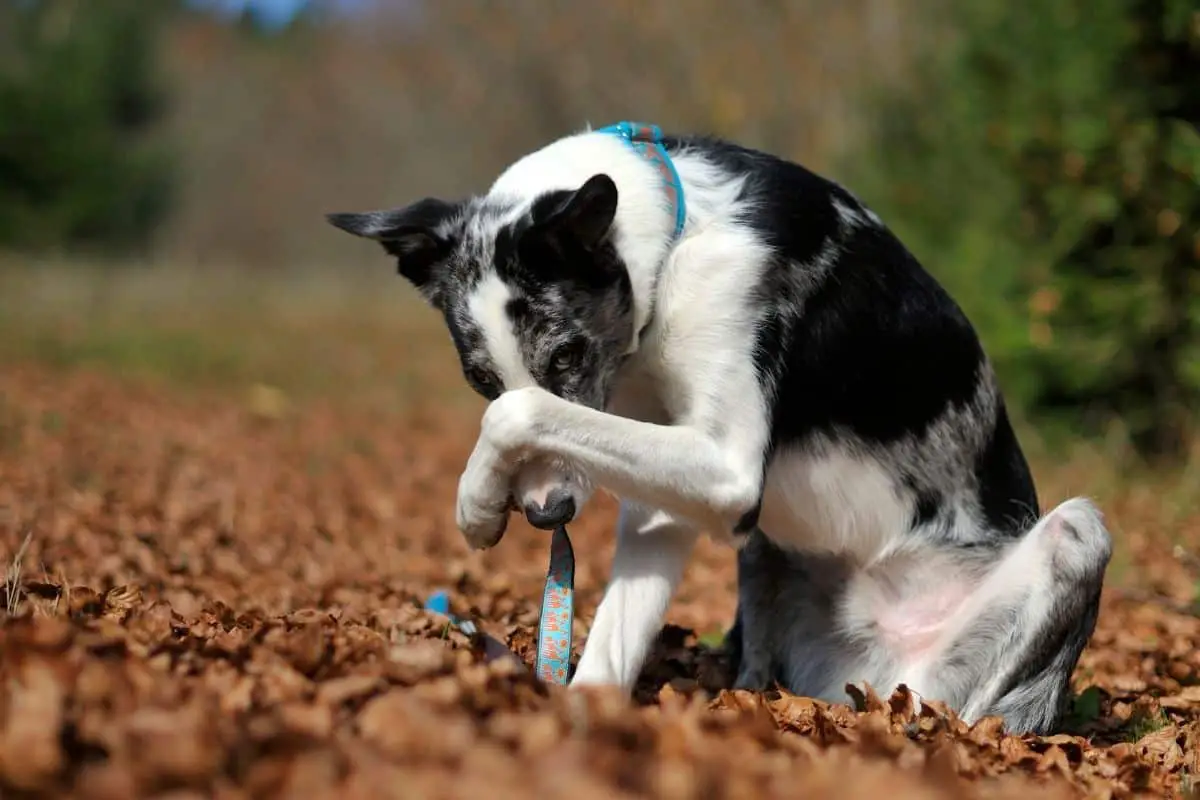
Frequently Asked Questions
Why Does My Dog Roll Around After Eating?
The most common reason for your dog to roll around after eating is because he’s eaten too much food and needs a break from the table. If you have an older or overweight dog, it may be because of this problem.
It might be a good idea to try feeding your pooch smaller meals throughout the day instead of one big meal. Also, make sure he gets plenty of water during the day as this can help to prevent overeating.
Why Is My Dog Scratching His Mouth?
Itching in your dog’s mouth is usually caused by fleas. Flea bites itch as soon as they happen because fleas secrete a substance called saliva that irritates the skin.
Fleas live on animals, and can transfer onto humans. However, you can protect yourself and your pet from fleas by using insect repellent sprays and powders. These products work by irritating the insects’ sense of smell.
Why Do Dogs Lick Faces?
Dogs lick faces for many reasons. Some dogs do it when they’re nervous or anxious, while others just like to play with their face.
Most dogs who lick their faces do so in order to remove any excess oil on their skin. They also use their tongue to clean their ears and eyes.
Licking faces shouldn’t be considered a bad habit. After all, it’s completely normal behavior for some breeds. But if your dog does it on a regular basis, it could indicate that there’s something wrong with their health.
The Bottom Line
To conclude, there are lots of different reasons why your dog might look to rub their face after finishing a meal.
Some of these are more positive than others, but fortunately there are plenty of ways you can rectify anything problematic.
Hopefully, after reading the information in this guide, you’ll be in a much better position to not only recognize the issue, but also swiftly deal with it. Good luck!
- What Dog Breeds Have Pink Skin? - March 24, 2023
- What Are the Most Inspiring Dog Breeding Quotes? - March 20, 2023
- Can Pheromone Spray Help Improve Dog Breeding Results? - March 19, 2023





